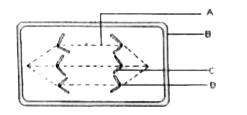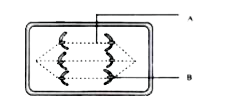Memory cells are formed from
Erythropoietic stem cells
Monocytes
T-lymphocytes
B-lymphocytes
The correct Answer is:C
Step-by-Step Solution:
1. Understanding Memory Cells: Memory cells are specialized cells that are part of the immune system. They are responsible for remembering past infections and providing a quicker response upon re-exposure to the same pathogen.
2. Analyzing the Options:
- Option A: Ritropoietic Stem Cells: These cells are involved in the production of blood cells through a process called erythropoiesis. They do not form memory cells.
- Option B: Monocytes: These are the largest type of white blood cells and play a role in the immune response, but they do not form memory cells.
- Option C: T Lymphocytes: These cells are crucial for the adaptive immune response and have the ability to recognize antigens. They can differentiate into memory T cells after an infection, which allows for a faster response to subsequent infections by the same pathogen.
- Option D: B Lymphocytes: These are also a type of white blood cell that plays a role in humoral immunity. They can also form memory B cells after an infection.
3. Identifying the Correct Answer:
- While both T lymphocytes and B lymphocytes can form memory cells, the question specifically asks about the formation of memory cells. T lymphocytes are particularly noted for their role in recognizing and responding to antigens, making them a key component in the formation of memory cells.
4. Conclusion: The correct answer is C: T Lymphocytes.
- Option A: Ritropoietic Stem Cells: These cells are involved in the production of blood cells through a process called erythropoiesis. They do not form memory cells.
- Option B: Monocytes: These are the largest type of white blood cells and play a role in the immune response, but they do not form memory cells.
- Option C: T Lymphocytes: These cells are crucial for the adaptive immune response and have the ability to recognize antigens. They can differentiate into memory T cells after an infection, which allows for a faster response to subsequent infections by the same pathogen.
- Option D: B Lymphocytes: These are also a type of white blood cell that plays a role in humoral immunity. They can also form memory B cells after an infection.
- While both T lymphocytes and B lymphocytes can form memory cells, the question specifically asks about the formation of memory cells. T lymphocytes are particularly noted for their role in recognizing and responding to antigens, making them a key component in the formation of memory cells.
Topper's Solved these Questions
- HUMAN HEALTH AND DISEASEBOOK - DINESH PUBLICATION ENGLISHCHAPTER - HUMAN HEALTH AND DISEASEEXERCISE - CHECK YOUR GRASP
17 Videos
- HUMAN HEALTH AND DISEASEBOOK - DINESH PUBLICATION ENGLISHCHAPTER - HUMAN HEALTH AND DISEASEEXERCISE - CHECK YOUR GRASP
17 Videos
- HUMAN EVOLUTIONBOOK - DINESH PUBLICATION ENGLISHCHAPTER - HUMAN EVOLUTIONEXERCISE - Brain Teasers-VII
181 Videos
- HUMAN REPRODUCTIONBOOK - DINESH PUBLICATION ENGLISHCHAPTER - HUMAN REPRODUCTIONEXERCISE - MCQ
770 Videos
Similar Questions
Knowledge Check
During Meiosis _______ daughter cells are formed
A4B2C8D6
The diagram given below represents a stage in cell division. Study the same and answer the questions that follows:

How many daughter cells are formed from this type of cell division ?
View SolutionA clone of plasma cells, which produce anti bodies and memory cells are formed by the proliferation and differentiation of
View SolutionWhen 16 cells are formed from a single cell, how many times cells divide and how many cells are formed in the 3rd generation?
View SolutionWho was the first to explain that the cells divide and new cells are formed from the pre-existing cells (Omnis cellu- la-e-ce/lula) in 1855?
View SolutionComplementary cells are formed by the activity of
View SolutionMemory cells are produced by
View SolutionHow many microspores are formed from 10 microspore mother cells by meiosis ?
View Solution

